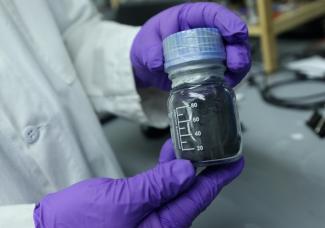NETL has received funding from the U.S. Department of Energy (DOE) Critical Materials Innovation Hub to expand research that transforms single-use water bottles, shopping bags and other waste plastic into a valuable, unconventional feedstock for manufacturing high-quality graphite.
“Graphite is a critical mineral needed by U.S. manufacturers to produce lithium-ion battery anodes for vehicles, military drones, backup power systems and more,” said NETL researcher Yuan Gao. “Working with partners through the DOE Critical Materials Innovation Hub will help establish a strong domestic supply chain of high-quality graphite while transforming polyethylene (PE) waste into a valuable resource.”
NETL’s unique process provides a simple method to turn PE into graphite that is comparable or higher quality than commercially available synthetic graphite.
The process diverts single-use plastics and other PE waste from the world’s oceans and landfills into the manufacturing sector, where it can be utilized for beneficial, revenue-generating purposes and help generate a strong domestic supply of a critical mineral needed to support U.S. national and economic security.
Funds awarded through the DOE Critical Materials Innovation Hub will enable NETL’s Carbon Materials Manufacturing team to continue a partnership with Oak Ridge National Laboratory, Ames National Laboratory and Ingevity, a global corporation headquartered in North Charleston, South Carolina.
The partnership was launched in January 2024 to convert PE waste and lignin (biomass generated by paper manufacturing and other plant-based industries) into pure and highly crystalline graphite suitable for energy-related applications, including battery anodes for fast-charging application in electric vehicles.
The goal of the upcoming work is to convert biomass-derived carbon and plastic waste-derived carbon char into graphite using a simplified chemical process that employs machine learning to screen process variables and determine the optimal value to use for each.
Plastic waste is a global problem that has challenged society for nearly 75 years. More than 7.8 billion tons of plastic have been produced since the 1950s, which is approximately one ton of plastic for every person alive. While some recycling methods exist, they are generally limited to waste streams that are relatively uncontaminated with food, dyes and additives.
Additionally, traditional recycling causes the deterioration of polymer properties. This deterioration means that plastics can only be recycled a few times before their technical and economic value is lost. Due, in part, to these limitations, only 6-7% of the plastic ever produced has been recycled.
NETL’s solution diverts plastics from waste streams into the manufacturing supply chain where the material can be used more beneficially and economically. The newly funded process joins the Lab’s other patent-pending technology to upcycle plastic waste and use it as a manufacturing feedstock for making a range of high-value, solid-carbon materials, including supercapacitors.
“By producing solid carbon materials, such as graphite, from waste plastic, we can sequester the waste in a high-quality product with a longer service life than the single-use plastics it is produced from. In the case of graphite used in batteries, the product can be recovered and reused at the end of device life, which extends the graphite service life even further,” said Christopher Matranga, a senior NETL researcher on the project.
The Critical Materials Innovation Hub was established in 2013 and is led by Ames National Laboratory as a sustained, multidisciplinary effort to develop solutions across the materials life cycle as well as reduce the impact of supply chain disruptions and price fluctuations associated with these valuable resources.
NETL is a DOE national laboratory dedicated to advancing the nation’s energy future by creating innovative solutions that strengthen the security, affordability and reliability of energy systems and natural resources. With laboratories in Albany, Oregon; Morgantown, West Virginia; and Pittsburgh, Pennsylvania, NETL creates advanced energy technologies that support DOE’s mission while fostering collaborations that will lead to a resilient and abundant energy future for the nation.




